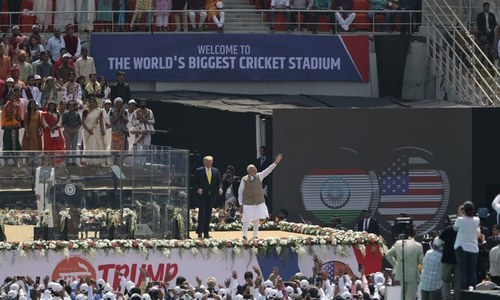New Delhi was blanketed in noxious haze on Friday as air pollution levels in parts of the city soared to “severe” levels, hours after US President Donald Trump described the air in the vast nation as “filthy”.
Smoke from agricultural burning, vehicle fumes and industrial emissions — combined with cooler temperatures and slow moving winds that trap pollutants over the city — turns air in the Indian capital into a toxic soup every winter.
The air quality index at Delhi's 36 pollution monitoring sites — which monitor tiny PM2.5 and PM10 particles that get into the bloodstream and vital organs — was between 282 and 446, pushing levels into the “severe” category, the Central Pollution Control Board said.
The “good” category is between 0-50, the government's environmental watchdog added.
A “significant increase in stubble fire count” to 1,213 in Haryana and Punjab states was the highest of this season and made up 17 per cent of Delhi's PM2.5 levels, the state-run System of Air Quality Weather Forecasting and Research added on Friday.
“Further deterioration of (air quality) is expected for the two days,” SAFAR said.
This season's burning started earlier because of advanced sowing and harvesting by farmers amid fears of labour shortages during the coronavirus pandemic, officials said.
The worsening conditions came as Trump complained that action on climate change was unfair to the US.
“Look at China, how filthy it is. Look at Russia, look at India — it's filthy. The air is filthy,” Trump said at his presidential debate with Democratic rival Joe Biden.
Soon after the US president's comments, 'filthy' and 'Howdy! Modi' — a reference to the massive rally held in Houston last year where the two leaders shared a stage — started trending on Twitter, the BBC reported.
Kapil Sibal, a senior leader of India's Congress party, asked if Trump's remark was the "fruits of friendship" between the two leaders and Howdy! Modi, the report said.
Meanwhile, Shekhar Gupta, editor-in-chief of The Print, added there was “no point in being outraged”.
"Every year about 15 of the 20 cities with the filthiest air in the world are in India. We’ve also done little to address this,” Gupta posted on Twitter. "Our air is an awful global embarrassment."
Scientists warned this year's pollution season would make Delhi's 20 million residents more vulnerable to the coronavirus.
“Air pollution increases the risk of noncommunicable diseases — the same underlying conditions that make people more likely to experience severe illness or death from Covid-19,” epidemiologist Sumi Mehta from global non-profit Vital Strategies told AFP.
Healthcare systems, stretched by the pandemic, could be further stressed by more hospitalisations from pollution-related illnesses, researchers added.
“There are serious worries that during winter when higher air pollution levels in any case worsens respiratory illness and increases hospitalisation, the vulnerability to Covid-19 may be further enhanced,” Anumita Roy Chowdhury of the Delhi-based Centre for Science and Environment told AFP.
The chief medical officer of Gurugram city near New Delhi, Virender Yadav, told The Times of India on Thursday some recovering Covid-19 patients were experiencing a recurrence of respiratory conditions triggered by the heightened air pollution.














































